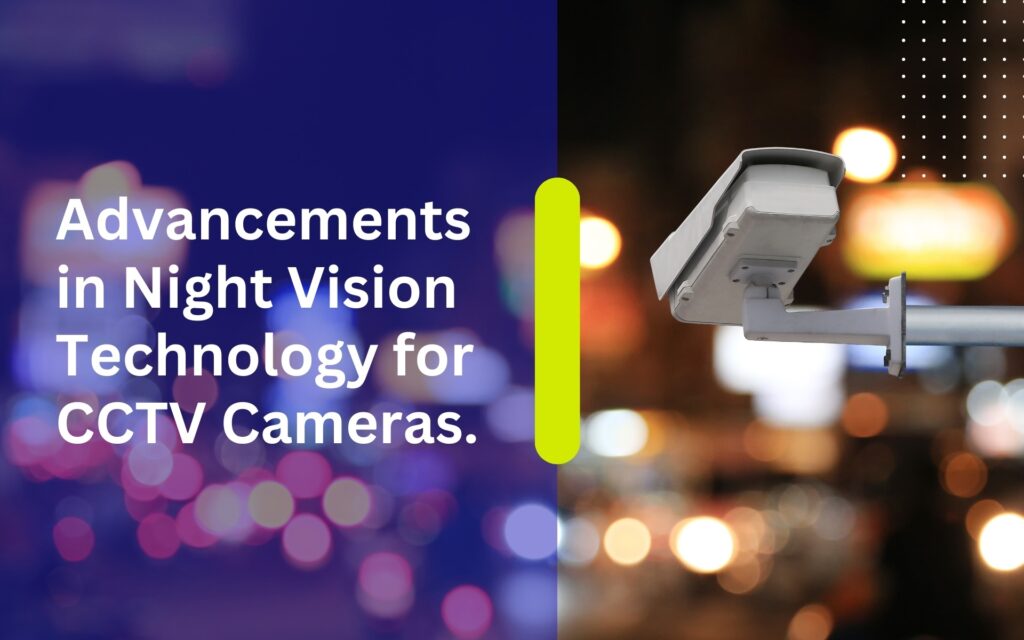The On-the-Job Training Experience of Chrisfel Zeye F. Mendoza Introduction. On-the-Job Training (OJT) plays a vital role in preparing students for the professional world by allowing them to apply academic knowledge in …
Advancements in Night Vision Technology for CCTV Cameras.

Introduction
In the realm of surveillance, the ability to see clearly in low-light conditions has long been a challenge. Whether for security purposes or monitoring wildlife, the effectiveness of CCTV cameras is often compromised when the sun sets. However, advancements in night vision technology have revolutionized the capabilities of CCTV systems, enabling round-the-clock surveillance with exceptional clarity and precision. In this article, we delve into the latest innovations in night vision technology for CCTV cameras, exploring how they work, their applications, and the benefits they offer.
Understanding Night Vision Technology
Night vision technology enhances visibility in low-light conditions, allowing cameras to capture clear images even in complete darkness. Traditionally, night vision relied on image intensification, which amplifies available light to produce visible images. This method, commonly found in earlier generations of night vision devices, has limitations in terms of range and clarity.
Modern CCTV cameras utilize advanced night vision technologies such as infrared (IR) illumination and thermal imaging. Infrared illumination works by emitting infrared light that is invisible to the human eye but detectable by the camera’s sensor. Thermal imaging, on the other hand, detects the heat emitted by objects and creates images based on temperature differences.
Advancements in Night Vision Technology:
1. High-Definition Resolution
One of the significant advancements in night vision technology is the integration of high-definition (HD) resolution cameras with infrared LEDs. These cameras offer superior image quality, enabling clear identification of objects and individuals even in complete darkness.
2. Smart IR Technology
Smart IR technology automatically adjusts the intensity of infrared illumination based on the proximity of objects to the camera. This prevents overexposure of nearby objects and ensures consistent image quality across varying distances.
3. Wide Dynamic Range (WDR)
WDR technology enhances the camera’s ability to capture details in scenes with high contrast lighting, such as areas with both bright sunlight and deep shadows. By balancing exposure levels, WDR ensures that crucial details are not lost in challenging lighting conditions.
4. Low-Light Sensitivity
Advances in sensor technology have greatly improved the low-light sensitivity of CCTV cameras. This means that cameras can produce clear images even in extremely low-light environments, without the need for additional illumination.
5. Thermal Imaging
Thermal imaging cameras detect the heat emitted by objects, making them particularly effective for surveillance in total darkness or adverse weather conditions. These cameras can detect intruders, wildlife, and even concealed objects with remarkable accuracy.
Applications of Night Vision CCTV Cameras:
1. Security and Surveillance
Night vision CCTV cameras play a crucial role in securing residential, commercial, and industrial properties during nighttime hours. They provide continuous monitoring of perimeters, entrances, and high-risk areas, deterring potential intruders and enabling swift response to security breaches.
2. Wildlife Monitoring
In conservation efforts and wildlife research, night vision cameras are invaluable for observing nocturnal animals without disturbing their natural behaviors. Researchers can study animal movements, behaviors, and population dynamics with minimal disruption to their habitats.
3. Traffic Monitoring
Night vision CCTV cameras enhance road safety by providing clear visibility in low-light conditions. They enable traffic authorities to monitor traffic flow, detect accidents, and identify potential hazards such as debris or obstructions on the road.
4. Search and Rescue Operations
In emergency situations, such as natural disasters or missing persons cases, night vision cameras aid search and rescue teams in locating individuals in remote or dark environments. Thermal imaging technology is particularly effective in detecting body heat signatures, even in challenging terrain.
5. Military and Law Enforcement
Night vision technology is widely used in military and law enforcement operations for surveillance, reconnaissance, and target acquisition. It allows personnel to conduct covert operations and gather valuable intelligence under the cover of darkness.
Benefits of Night Vision CCTV Cameras:
1. Enhanced Security
By extending surveillance capabilities into the night, night vision CCTV cameras improve overall security, deterring criminal activity and enhancing incident response.
2. Cost-Effectiveness
Investing in night vision CCTV cameras eliminates the need for additional lighting infrastructure, reducing operational costs while maintaining effective surveillance.
3. Versatility
Night vision CCTV cameras are suitable for a wide range of applications, from home security to industrial monitoring, making them a versatile solution for various surveillance needs.
4. Peace of Mind
With night vision technology, property owners and managers can have peace of mind knowing that their premises are under constant surveillance, regardless of the time of day or lighting conditions.
5. Safety
Night vision CCTV cameras contribute to public safety by providing visibility in low-light environments, helping to prevent accidents, crimes, and other incidents.
Conclusion
Advancements in night vision technology have transformed the capabilities of CCTV cameras, enabling them to provide clear and reliable surveillance even in low-light conditions. With features such as high-definition resolution, smart IR technology, and thermal imaging, these cameras offer enhanced security, improved situational awareness, and greater peace of mind for users across various industries. As technology continues to evolve, we can expect further innovations that will further enhance the effectiveness and versatility of night vision CCTV systems, ensuring safer and more secure environments for years to come.
Related Articles
The On-the-Job Training Experience of Kyle A. Dejos Introduction Internships serve as a strong foundation for future professionals, especially in the field of Information Technology where hands-on experience is essential. Kyle A. …
Protecting Your Business with Reliable IT Security Solutions. Introduction. In today’s fast-paced and technology-driven world, businesses face increasing security threats that can lead to devastating financial and reputational losses. A recent robbery …



